All of Us Strangers
by Hope Madden
Loneliness can be self-imposed, but that doesn’t make it any easier to overcome.
Adam (Andrew Scott) is alone. A writer living in a London high rise that’s still under construction, his solitary days bleed into his solitary nights, 80s hits on video and vinyl his main companions.
Adam is trying to write about his parents, so he decides to leave his flat, take a train, and revisit his old neighborhood. And soon his solitary days turn into afternoons spent with his parents (Claire Foy and Jamie Bell) and nights spent with his only neighbor, Harry (Paul Mescal).
What follows is a beautiful, melancholy meditation on reconciling your love for someone who has failed you, recognizing their love for you and their failure.
Scott doesn’t anchor the film as much as he haunts it with a turn that’s achingly tender and forgiving. Meanwhile, Mescal delivers another beautifully wounded performance, raw with emotion and sensuality.
Foy is a delightful change of pace, conflicted and unsure, and Bell stands out as the dad you really want him to be: honest, culpable, sorry, deeply loving.
Writer/director Andrew Haigh (45 Years) expertly weaves the lonesomeness of childhood traumas, as misunderstood and overwhelming as they can be, with personal identity. What of your traumas created who you are? What of who you are created your traumas?
Though never illogical, logic itself is far from the driving principle in Haigh’s storytelling. Emotional honesty, perhaps. Desire, certainly.
All of Us Strangers is a tough film to summarize and even tougher to categorize. It exists in a dream state bound by loss and isolation. Naturally, the only way to puncture that atmosphere is with love.
In many ways, this film should not work. Genre elements litter the script that, told by any other filmmaker, would run either maudlin or cheesy. But Haigh’s hypnotic touch creates a tone equally honest and obscure yet full of wonder. It’s also utterly devastating.






